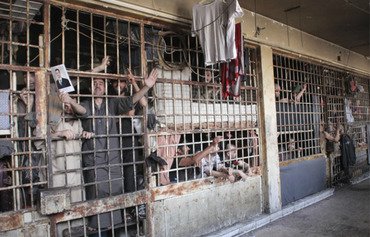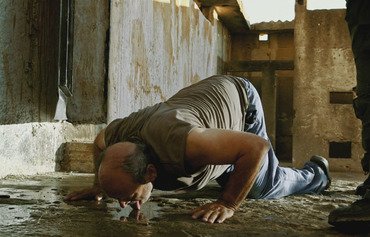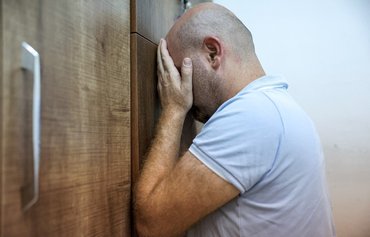Former inmates who were incarcerated in Syrian prisons shared chilling accounts of their experiences with Diyaruna, revealing that overcrowding, mistreatment, abuse and torture were rife in facilities around the country.
According to one former prisoner, "hell is more merciful than Syrian prisons".
Many "have horrendous reputations and all hold many times their prisoner capacities", said Syrian attorney Bassam Bashir, who currently resides in Cairo.
The most notorious of these detention centres are the Tadmur (Palmyra) prison and the prisons of Saydnaya, al-Mezzeh, Adra, Idlib and the Khan Abu al-Shamat detention centre, he told Diyaruna.
![A still from the film ‘Tadmor’ shows Syrian prison guards torturing an inmate by strapping him to a car tire in a method known as "the wheel". [Photo courtesy of Tadmor movie]](/cnmi_di/images/2017/03/06/7387-Syria-detainees-movie-600_384.jpg)
A still from the film ‘Tadmor’ shows Syrian prison guards torturing an inmate by strapping him to a car tire in a method known as "the wheel". [Photo courtesy of Tadmor movie]
State intelligence agencies including the Palestine branch, the Air Force Intelligence branch, al-Mantaqa branch (Branch 227) and Regiment 555 have have turned some of their facilities into detention centres, Bashir said.
New prisons have been opened at al-Dumayr airbase in rural Damascus and al-Mezze military airport, and many intelligence agency branches across the country have been fitted with prison cells, he said.
"It is not possible to ascertain the actual number of detainees in Syria, because prisons are overflowing with detainees and holding many times their capacity, and because the regime does not follow the due process of law with regard to the maintenance of prison records," Bashir said.
Constraint and flogging
Qasim al-Akhras, 65, a merchant from Aleppo who now lives in Cairo, told Diyaruna the time he spent in Adra Prison on the outskirts of Damascus was "the worst period in my life".
"I was subjected to the ugliest forms of inhumane treatment," he said.
His ordeal began when he was detained on September 4, 2012, he said, adding that during the half-hour drive to a Damascus security centre, "I was beaten with sticks and showered with insults of every kind".
"When I was pulled out of the vehicle, the guards at the detention centre joined the elements who detained me in beating me, until I was taken directly to the interrogator’s room, who never spoke to me and only nodded," al-Akhras said.
"I was then taken to an extremely foul smelling toilet room that had no light or air vents," he said, where he remained until the next evening, when he was blindfolded and taken to another room.
Here he was handcuffed and hung up above the ground.
"One of them applied dozens of lashes to my back until I lost consciousness from the pain," he said. "Sometime later, I opened my eyes and found myself back in the toilet room."
The next day he was transported, along with four other detainees, to Adra, where he was immediately taken to the interrogation room.
Overcrowding and torture
For a month, al-Akhras said, he was beaten and interrogated on the charge of "financially supporting terrorist elements" -- a charge he refutes, saying he was in Damascus to meet with merchants and purchase stock for his shop.
He eventually broke down and confessed to things he never did, he said, thinking this "would put an end to the torture".
"However, it continued, and the interrogator pulled out one of my right hand fingernails and burned my back with a red-hot rod, whose marks are still visible," al-Akhras said.
For the first month, he was kept in a cramped cell in solitary confinement, where he was given one piece of bread and a foul-smelling cup of water.
"I was then transferred to the wards, which were not much better than the solitary cell," he said.
There were 45 detainees in the room, he said, which at six metres long and four metres wide provided barely enough space for 15 people.
Each prisoner occupied a space barely larger than his body, he said, adding that if anyone tried to stand up or move to a different spot, they would lose their sleeping space.
They often "slept in the sitting position and leaned against each other", he said. "The room was not equipped with a toilet, so the prisoners defecated in a bucket in a corner that was emptied once every morning."
Al-Akhras said he remained in prison until December 30, 2013 when his family reached a settlement with a politician in Damascus in exchange for $150,000.
He stayed in Syria only briefly after that, he said, then left with his family to Lebanon and from there to Cairo.
Beaten on 'the wheel'
Egyptian merchant Tawfiq Saleh, 60, who asked to use a pseudonym out of fear for his safety, told Diyaruna that a simple dispute with a Syrian security agency official cost him his freedom for 17 years.
Saleh was arrested in Beirut in 1994 and transported to Syria, where he remained in detention until 2011, he said, adding that for approximately six years he was incarcerated at the notorious Saydnaya prison .
He was subjected to the same kind of torture "in all the detention centres to which I was transferred", he said.
"I was initially detained at Beau Rivage, where I was led to a lower floor and flogged all over my body," he said. "I was electrocuted through my fingers and sensitive areas, and was severely beaten after being tied to a car tire."
This method is known as "the wheel", he said, explaining that the legs are tied in a way that has the feet facing upward, making it easier for the flogger to hit both feet for the duration of the torture session.
"I was tortured by the 'ghost method', where my hands were tied to a chain hanging from the ceiling and I was lifted up so my feet barely touched the floor. I was kept in that position for hours and beaten severely," he said.
Guards also tortured him using the "flying carpet" method, he said, where he was tied to a wooden plank the size of his body and lifted in the air and beaten.
Some of these terms were coined by guards and others by prisoners, he said.
Saleh said he was first transferred to the Palestine branch, "where I was subjected to all kinds of beatings, including with a wooden rod, metal chains, a reinforced plastic pipe and sometimes ropes, until it I was transferred to Tadmur prison where I spent the remaining years of my detention".
'Like living in hell'
Life in Tadmur was miserable, Saleh said.
"It was like living in hell itself. Degrading words are all the detainees hear, in addition to insults that spare no one," he said.
"In addition to the torture, flogging, beatings and electrocution, the jailers indulged in all sorts of sadistic behaviour against the detainees," he said.
This included "forcing them to drink urine, eat cockroaches, curse themselves and shout out cheers for the Syrian president", he said, adding that the guards also burned the prisoners with cigarettes and cigarette lighters.
Saleh said he was released from prison on grounds of ill health, with a slipped disc in his back, asthma, high blood pressure, diabetes and an eye disease.
The symptoms of his various afflictions appeared while he was in prison, he said, but he did not receive treatment or medicine, and neither did anyone else.
Despite his suffering, Saleh said, he considers himself lucky, as many prisoners lost their lives due to complications with diseases they had, while others were killed in systematic executions.
Even so, he added, he left prison with "bad memories that I do not think I will ever forget for the rest of my life".

![A still from the film, ‘Tadmor’, shows harsh treatment in Syrian regime prisons. The film was produced in collaboration with the Association of Lebanese Detainees in Syria and is co-directed by Monika Borgmann and Lokman Slim. [Photo courtesy of Tadmor movie]](/cnmi_di/images/2017/03/06/7386-Syria-detainees-movie-600_384.jpg)







I do not know what to say for this sort of inhuman torture. In any case, we are all human beings and we have to put ourselves in other's shoes and fight to look for and find the way to definitively eradicate this type of torture, which totally breaks men by treating them as animals.
Reply1 Comment(s)